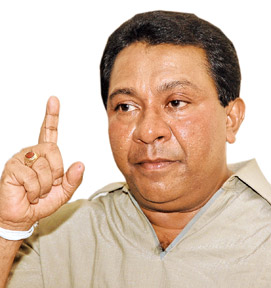Win win situation
Uvindu ILLEPERUMA

Higher Education Minister S B Dissanayaka |
Whenever a decision related to Higher Education of Sri Lanka is
made, it always gives rise to pessimism. The rumour that the government
is going to ban External degree courses has already reached its boiling
point. It is ironical that this has already ruffled the feathers of not
only potential external degree followers but politicians of the
opposition.
Daily News met with the Higher Education Minister S B Dissanayaka to
get to the bottom of this.
Q: There’s a hue and cry that government is going to stop External
Degree Courses. What is the stance of the government regarding the
issue?
A: We are not going to stop External Degree Courses. In fact we plan
to enhance their standards. Prevalent methods are not at all up to
standards expected by the government in its attempt to make the country
a centre of knowledge in Asia. Current External degrees offered by the
Universities cannot cater to the job market.
Most students who are taking those courses choose easy subjects such
as Sinhala, Political Science, History, Philosophy or Sociology. This is
not the issue. But students who want to have good jobs should be offered
subjects in demand.
When graduates with External Degrees expects jobs from government or
private sector they feel they are left in a lurch. Efforts taken over
three to four years are wasted. They become a burden not only to the
country and the government, but also themselves. This is the only reason
for the issued road map.
 Q: What are the measures the government has already taken to improve
these courses? Q: What are the measures the government has already taken to improve
these courses?
A: In the short term, we are planning for standardize courses. Then
the students can register themselves for new courses which would offer
them latest knowledge. In the long term we will be registering
institutes that offer such courses. All courses will be run under the
supervision and the expertise of the faculties and the departments of
universities.
For this we will establish a Quality Assurance, Accreditation and
Qualification framework Council under the Quality Assurance,
Accreditation and Qualification framework Act.
The council would include Vice Chancellors, professors and lecturers
of the universities.
Through this council surveys will be implemented in pursuit of
quality assurance, accreditation and qualification of both external and
internal degree courses in universities, so the students will be able to
follow standard and well constructed degree courses in near future.
Moreover student will be given the opportunity to follow courses
which are newly introduced.
Q: When will this bill be presented in the parliament?
A: We have already prepared the bill. It will be enacted soon.
Q: What about the advent of Private Universities?
A: Private Universities which are which are allowed through the act
will be conducted under the supervision of Quality Assurance,
Accreditation and Qualification framework Council we will suggest
through the bill.
What we should keep in mind is that Private Universities are not at
all a new concept to Sri Lanka. Seventy-two Higher Educational
Institutes have been granted approval from BOI. Fifty-four of them are
still in operation, while 10 to 15 Institutes have closed down.
Some Institutes are doing well while some others are cheating the
students. After the act is empowered these problems will be hopefully
solved.
Q: How does the ministry plan to balance facilitating Private
Universities while upgrading State Universities?
A: With the Act of Quality Assurance, Accreditation and Qualification
framework Private Universities and the Institutes which are already
conducting courses will come under Higher Education Ministry, UGC and
Quality Assurance, Accreditation and Qualification framework Council for
the first time. We will be imposing necessary laws and regulations to
keep these in check.
For example we have already planned to ban university lecturers from
working in private universities on permanent basis. But we allow them to
work there on visiting basis. We have come to terms with Private
Universities which are aiming to get 15 % to 20 % of students free of
charge.
Forty to fifty thousand students who cannot afford higher education
at foreign universities due to financial problems will be given the
opportunity to enter local representatives of foreign universities
through this 20% quota.
Q: What are the other benefits of private universities?
A: Universities that have expressed interest in setting up branches
claim that they can offer low cost courses for students. Manipal
University of India in particular has already pledged that they can
offer courses at low prices than that of Russian, Singaporean, Chinese,
Australian and British Universities.
Most students go to these countries due to low tuition fees. If the
proposed foreign universities can offer low prices we hope more students
will opt to stay. This could save a lot of foreign exchange out-flow.
Through taxing private universities we can upgrade the facilities of
State Universities.
This is a win win situation. We can get the support of the professors
who will be contributing to the Non State Universities to upgrade state
universities through research and development. We can pay more for the
intellectuals of State Universities, since the country’s coffers would
be fattened with the income from non state universities in Sri Lanka. |



